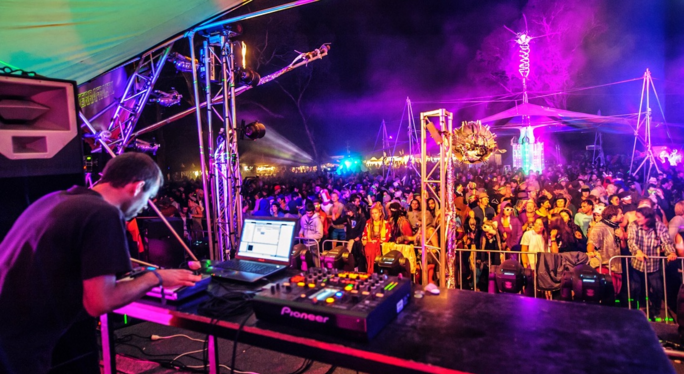Prohibition is a policy that rarely works. Well, for our vices it would seem that way. Drug use at festivals is the modern day example of why having a no-tolerance attitude towards the ramifications of their misuse do more harm than good to communities. The latest victim of this tragedy? A young girl called Anneke Vo, who died from a suspected drug-related death at the Dragon Dreaming Festival.
The 23-year-old was found dead at around 5:30am at the festival in Wee Jasper near Lake Burrinjuck, about 50 kilometres south-west of Yass.
The usual discussion around drugs and festivals has flared up again. Even Vo’s sister has called for stricter controls around bringing drugs into festivals.
“A tragic loss to our family that we wish will never happen upon anyone else! Just hoping more strictly monitor of drug abuse and more looking out for each other festival goers !” Ms Nguyen wrote in a post to the Dragon Dreaming festival’s Facebook page.
Superintendent Zoran Dzevlan has commented on the situation, insinuating that if the festival hadn’t taken place, then Ms Vo would be alive.
“I didn’t want this event to happen in the first place. We put our objections forward to council and as a result of these drug detections, and the tragic death of a young lady, we will again be putting our recommendations forward for this event not to take place in our community,” said Superintendent Dzevlan.
As Miles Hunt, a lawyer and director of drug law reform and harm-minimisation organisation Unharm, points out in his piece for the Sydney Morning Herald, if someone had died in a car accident on the way to the festival, would their be calls for it to be banned in the future? No, because it is the link between drug taking and festival attendance that is stressed in these situations.
Over the course of that festival, 40 people were caught with drugs. That’s quite a lot when you think about. However, to put it into perspective 5,000 people went to Harbourlife. How many of those attendees would have been using illicit drugs considering the event bills itself as ‘Sydney’s essential outdoor party’? I’m going to say the large majority.
When people die at music festivals, all it proves is that punters take drugs at music festivals. Statistically speaking, the large majority of people who take drugs at festivals don’t die, so why is one death hijacked by the national discourse and interpreted as the symptom of a raging drug epidemic?
This kind of archaic view is actually symptomatic of the nanny-state laws put in place in attempt to control people’s behaviour, not keep them safe. Posting police officers at the entrance of festivals with sniffer dogs creates an atmosphere of surveillance. It criminalises the average punter and body searches violate their rights as a human being. Often revellers don’t even know what rights they forfeit in the terms and conditions of their ticket purchase. We need to only look to countries like the Netherlands and Portugal, who have instated drug regulation policies which have not only seen an increase in purity (ie you get what you pay for), but a reduction in drug-related deaths at music events.
Of course, these rules are put in place to exonerate festivals of blame when something bad happens. It has gotten to the point now that cruises on Sydney Harbour are now being cancelled due to a series of incidents such as violent assaults, use of prohibited drugs and excessive alcohol consumption.
But this is just a bandaid solution which doesn’t address the underlying problem at work here. As we’ve seen with lockouts, when you prohibit the activity of something from taking place in a legal, safe place, it pushes the problem into unregulated and clandestine venues where their is no safety and no oversight. Our culture of excessive drug and alcohol consumption is a cultural problem that can’t simply be legislated out of existence.
As previously stated, prohibition doesn’t work. States in the U.S with abstinence-only sex education programs have the highest rates of teenage pregnancy. During the prohibition era in the 30’s, alcohol consumption actually went up, as well as alcohol related deaths due the unregulated and often toxic substances that flooded the black market.
Why should drug use be viewed as anything different? In Portugal, where all drugs have been decriminalised for 14 years, the rate of drug use has dropped across almost every indicator. Harm minimisation tactics in Europe such as testing kits at festival and government sponsored counselling services turn drug use from a criminal matter into a social issue.
Decriminalising drug possession and drug use would go a long way to stop alienating high risk groups of people from seeking help when things go wrong. Removing the social stigma attached to drug use would prevent unnecessary deaths like Bartter’s and Vo’s.
Let’s face it: the sooner we simply accept that young people will experiment with drugs, the sooner we can tackle the consequences accordingly. Legalisation won’t encourage more drug use because decriminalisation certainly hasn’t stopped it. Our best hope to control the ill-effects of their use is through regulation. Music festivals are place where people come together to connect and experience that community the comes from their collective love of music. So let’s try to keep it that way by keeping people safe.

